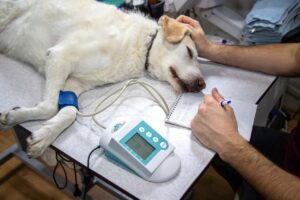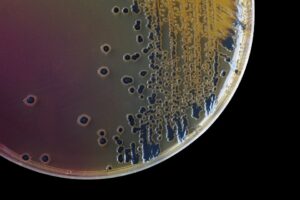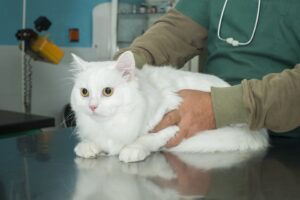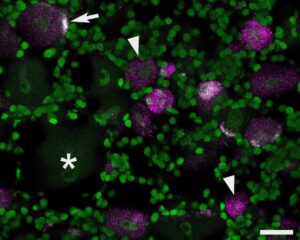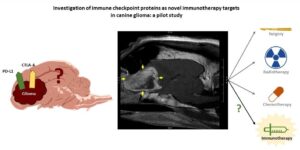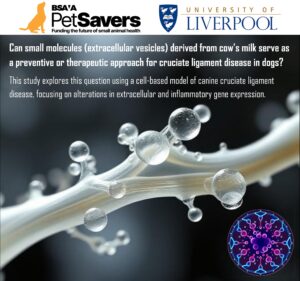Projects awarded funding in 2025
This is a summary of the grants that have been awarded funding so far this year. You can also view funded projects by disease area.
|
|
Identification of primary closed angle glaucoma genetic risk factors in the Welsh Springer Spaniel: using a whole genome sequencing analysis approach to tease apart the genetics of pectinate ligament abnormality and primary glaucomaClinical Research Project Grant: £20,000 Institution: University of Cambridge Lead researcher: Katherine Stanbury Aim: To identify genetic variants strongly associated with glaucoma and/or PLA which will aid understanding of disease and could be used to develop a genetic test. |
|
|
Antifungal drug resistance in Malassezia pachydermatis from dogs: an emerging clinical challengeClinical Research Project Grant: £18,809.82 Institution: RVC/University of Liverpool Lead researcher: Ross Bond Aim: To characterise the prevalence of antifungal resistance in clinical isolates of Malassezia pachydermatis isolated from canine otitis externa and dermatitis, and identify underlying genetic mechanisms. These findings will help inform therapeutic choices, as well as future surveillance and drug stewardship programmes. |
|
|
Characterisation of saliva as a source for assessing phenobarbitone levels in canine epilepsy cases as a first step in developing a point of care deviceClinical Research Project Grant: £18,981 Institution: University of Glasgow Lead researcher: Mark McLaughlin Aim: To determine whether saliva can be used to monitor circulating levels of phenobarbitone and used in a detection test for owners. This would have clinical applicability when starting treatment for epilepsy as well as when making drug adjustments. |
|
|
Characterisation of the gastrointestinal microbiome and detection of inflammatory markers in the faeces of dogs diagnosed with steroid responsive meningitis-arteritis and immune-mediated polyarthritisClinical Research Project Grant: £12,336.69 Institution: University of Edinburgh Lead researcher: Ana Oliveira Aim: To identify changes in the gut microbiome and signs of gastrointestinal inflammation in dogs with SRMA and IMPA to determine whether there is a link between the gut microbiome and autoimmune disease in these dogs, as observed in humans. |
|
|
Prevalence of Congenital heart disease in Neonatal puppies experiencing unexplained death, diagnosed by micro-Computed Tomography (the ConNeCT study)Clinical Research Project Grant jointly funded with the Veterinary Cardiovascular Society: £10,000 Institution: Bristol Vet Specialists/University of Cambridge/Great Ormond Street Institute of Child Health Lead researcher: Caroline Cutler Aim: To use micro-CT to describe the prevalence of structural congenital heart disease in neonatal puppies aged up to 4 weeks old that have experienced unexplained death. |
|
|
Acute phase protein concentrations in canine pericardial effusionsClinical Research Project Grant jointly funded with the Veterinary Cardiovascular Society:£10,000 Institution: Willows Referral Centre Lead researcher: Sophie Goodrich Aim: To determine whether biomarker concentrations vary between different causes of pericardial effusions, and to contribute to our understanding of the underlying cause of idiopathic pericardial effusion in dogs. |
|
|
Primary investigation of microRNA small-RNA sequencing profiles in dogs with prostatic carcinomaClinical Research Project Grant jointly funded with SAMSoc: £9,750 Institution: AURA Vets and the University of Surrey Lead researcher: Gerard McLaughlin Aim: To determine whether there is a difference in blood profiles of microRNAs in dogs with prostatic cancer versus control dogs, which could lead to the development of a minimally invasive diagnostic tool. |
 |
Feasibility and accuracy of video based automated generalised tonic-clonic seizure detection in dogs using artificial intelligence algorithmsClinical Research Project Grant jointly funded with the British Veterinary Neurology Society: £10,000 Institution: University of Glasgow Lead researcher: Jos Bongers Aim: To determine whether AI can be used to accurately and reliably detect generalised tonic-clonic seizures in dogs to enhance seizure monitoring in both veterinary clinics and home environments. |
|
|
Hypermutation in Escherichia coli from feline lower urinary tract diseaseStudent Research Project Grant: £2,400 Institution: RVC Lead researcher: Sian-Marie Frosini Student: Madeline Yuhasz Aim: To establish whether hypermutator E. coli are present in the feline urinary tract and identifying risk factors for hypermutator-related infections with a view to understanding their impact on driving antimicrobial resistance. |
|
|
Immunohistochemical analysis of cyclooxygenase-2 induction in feline hypertrophic cardiomyopathyStudent Research Project Grant: £3,200 Institution: RVC Lead researcher: Bernat Marti Garcia Student: Nadia Szymiec Aim: To investigate the expression of COX-2 in feline hypertrophic cardiomyopathy in comparison to healthy feline hearts and associate this with clinicopathological features to determine its potential as a therapeutic target. |
|
|
Exploring the role of cancer stem cells in feline injection-site sarcomas: active metabolic pathways and therapy responsesStudent Research Project Grant: £1,400 Institution: University of Edinburgh Lead researcher: Lisa Pang Student: Michelle Lai Aim: By identifying the characteristics of feline infection site sarcoma stem cells, there is the potential to select drugs that target proteins or metabolic pathways that drive tumour growth. |
|
|
A laboratory appraisal of SCN10A as an analgesic target in canine sensory neuronsStudent Research Project Grant: £2,800 Institution: University of Glasgow Lead researchers: Andrew Bell and Paula Ledesma Fernandez Student: Brandi Butler Aim: Novel pain killing drugs in humans target the neuron-specific sodium channel Nav 1.8, but it is unclear if these drugs will work in dogs. By understanding the cellular patterns of Nav 1.8 in the dorsal root ganglion, the hope is to be able to rationalise the use of novel pain killers in dogs and ultimately treat pain better. |
|
|
Surveillance of antimicrobial resistance in clinical infections from companion animalsStudent Research Project Grant: £2,400 Institution: University of Liverpool Lead researcher: Dorina Timofte Student: Olivia Freeman Aim: To generate novel standardised antimicrobial susceptibility testing data from bacterial isolates and compare these with original laboratory data, with a view to harmonising data from companion animal AMR surveillance. |
|
|
CD44 expression in feline cholangiocarcinoma: A potential therapeutic target?Student Research Project Grant: £3,200 Institution: RVC Lead researcher: Alejandro Suárez-Bonnet Student: Kathy Mu Aim: The discovery of therapeutic targets in feline liver cancer would be a major breakthrough in veterinary medicine and oncology which will almost certainly pave the way for immediate further clinical research, initially in vitro, and hopefully, in vivo. |
|
|
Investigation of immune checkpoint proteins and novel immunotherapy targets in canine glioma: a pilot studyStudent Research Project Grant: £2,400 Institution: RVC Lead researchers: Andy Yale Student: Sunita Garg Aim: Novel treatment strategies beyond surgery, radiation therapy and chemotherapy are desperately needed for canine glioma as outcomes have remained stagnant over the last decade; this study aims to investigate the expression of immune checkpoint proteins as possible immunotherapy targets. |
|
|
Investigating the therapeutic potential in canine cranial cruciate ligament disease of bovine milk-derived extracellular vesicles using an in vitro cell-based modelStudent Research Project Grant: £2,800 Institution: University of Liverpool Lead researcher: James Anderson Student: Harry Hields Aim: Milk-derived extracellular vesicles present a promising, low-cost, and easily scalable therapeutic option for treating or preventing canine cranial cruciate ligament disease, which significantly impacts a dog’s quality of life. Their integration into current treatment protocols could lower costs, improve accessibility, and reduce the number of untreated cases, ultimately enhancing canine welfare. |
|
|
Determining the presence of Gram-negative ESKAPE organisms and antimicrobial-resistant Escherichia coli in commercially available alternative diets for dogs and catsMaster’s Degree by Research: £41,730 Institution: University of Liverpool Lead researcher: Genever Morgan Aim: These bacteria have the potential to cause serious, difficult-to-treat infections, so this study will add to the evidence about the microbiological risks of certain pet diets, providing valuable information for veterinary professionals and pet owners. |






